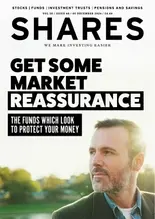
While the US earnings season got off to a perfectly respectable start, the big tech names have really let the side down.
Online retail goliath Amazon (AMZN:NASDAQ) was the latest to disappoint with warnings on festive spending and, probably more worrying for investors, the slowest growth for its prized Amazon Web Services cloud computing arm on record.
Revenue from the division was still up by a third but at $20.5 billion was short of the $21.1 billion expected by analysts.
Apple (AAPL:NASDAQ) probably fared the best of its counterparts thanks to strong Mac sales linked to new product launches but there were signs of weakness elsewhere in the business and there was a notable lack of guidance to match the uncertain outlook.
Overall Wall Street was just about keeping its head above water, bar the technology-heavy Nasdaq index, with the domestic names in the Russell 2000 faring best as they don't suffer the same hit from a stronger dollar.
ALPHABET/META PLATFORMS
All this belt-tightening is starting to really hurt, even hitting companies that have previously seemed impervious to economic vagaries.
Now, in the thick of a slowdown in ad spending and with a potential recession looming, quarterly results from Alphabet (GOOG:NASDAQ) and Meta Platforms (META:NASDAQ) over the past week missed forecasts and saw their share prices tumble, Meta to a seven-year low.
Snapchat-owner Snap (SNAP:NYSE) had already raised a red flag on ad spending the previous week, but the parent companies of Google and Facebook have been online ads' dominant duopoly for years, and are seen as a bigger industry gauge.
In a glaring spotlight, Alphabet's third-quarter sales grew just 6% annually, the slowest pace since June 2020, as executives spoke of deepening cuts in ad spending. Scott Kessler, an analyst at Third Bridge, noted that as Meta's revenue has fallen in the past two quarters and its spending increased, its free cash flow plummeted. In the third quarter, Meta's free cash flow was $173 million, compared with $9.5 billion a year ago.
Until recently, slowing consumer spending would have meant brands cutting non-digital ads but maintaining, or even raising, online spending. But with most ad dollars now going online, that strategy is running out of road. Wall Street is sending obvious signals that Alphabet and Meta need to tighten their own belts.
COCA-COLA
Shares in Coca-Cola (KO:NYSE) bubbled up to $59.40 after the beverages behemoth's third quarter results (25 October) beat forecasts and the Atlanta-based company joined arch-rival PepsiCo (PEP:NASDAQ) in raising full year guidance.
Revenue grew 10% to $11.1 billion and earnings per share (EPS) rose 7% to 69 cents in the quarter to 30 September, ahead of the $10.5 billion and 64 cents analysts were looking for respectively, as the soft drinks giant hiked prices by 12% without hurting demand and global unit case volumes increased by 4%.
‘Our strong capabilities and consumer insights continue to help us win in the marketplace,’ insisted CEO and chairman James Quincey. ‘Our business is resilient amidst a dynamic operating and macroeconomic environment. We are investing in our strong portfolio of brands, which is a cornerstone of our ability to deliver long-term value for our stakeholders.’
In a show of confidence, Coca-Cola raised its full year organic revenue growth guidance to a 14% to 15% range, an upgrade from up prior expectations of 12% to 13% and lifted its annual EPS growth forecast to 6% to 7%, up from 5% to 6%.
VISA
Credit card provider Visa (V:NYSE) echoed the upbeat comments from rival American Express (AXP:NYSE) on consumer spending when it reported fourth-quarter earnings this week.
Chief executive Alfred F. Kelly Jr said the firm saw ‘a continuation of many of the spending trends present throughout 2022’ including strength in consumer payments, resilience in e-commerce and an ongoing recovery in cross-border travel.
The company posted a 19% jump in revenues to $7.8 billion and a similar increase in adjusted earnings per share to $1.93 for the September quarter, both ahead of market estimates.
There was more good news for investors, with a 20% increase in the quarterly dividend to 45 cents per share and a $12 billion share buyback.
While acknowledging there was ‘some short-term uncertainty’, Kelly said the firm was confident in the outlook for the coming financial year. Shares in Visa have gained 16% from their intraday low of $175 a fortnight ago.




